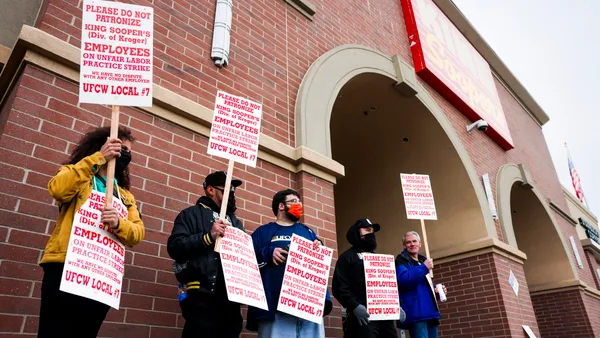Dive Brief:
- Los Angeles-based Milk & Eggs, an online perishable food market and delivery service, has raised $6 million in seed funding led by Morningside Venture Capital, an early-stage venture investor based in China. The money will be used to improve operations, customer experience and technology as the company looks to expand, according to founder and CEO Kent Wu.
- Milk & Eggs, which was founded in 2016, serves the greater Los Angeles area. The company works with local farmers and artisans to provide customers with fresh, high-quality, locally sourced dairy, eggs, meats, fish, baked goods and produce.
- Wu says Milk & Eggs is not trying to compete directly with Walmart, Kroger or other supermarkets. Milk & Eggs offers more of a made-to-order, online farmers market experience. “That carrot that you’re ordering is still in the ground at the farm. The bread that is being delivered hasn’t been baked yet. Everything is to order. After an order is placed, the farmer harvests or makes the food for the customer,” Wu told AgFunder News.
Dive Insight:
While there is some debate about whether grocery delivery will reach a tipping point among consumers, it is clear that customer appetite for delivery continues to grow. When you combine that with increasing demand for more local food, it’s easy to see why Milk & Eggs has great potential to succeed in the Los Angeles area.
Although its local products and community-driven approach stand out from larger grocery delivery services like Instacart and Shipt, which partner with traditional supermarkets, Milk & Eggs is entering a crowded space. Similar companies have been on the rise around LA and in other areas for a while now. GrubMarket, Farm Fresh to You, Out of the Box Collective and Farmbox Direct are all similar services operating in the region. Farmstead and Good Eggs, which both operate in the San Francisco Bay Area, are also popular. While they are not yet direct competitors of Milk & Eggs, these companies have plans to expand, and their early success and use of technology may bring them to L.A in the future.
An additional challenge for Milk & Eggs is the ability to scale. With a focus on working with local artisans and farmers and a commitment to serving the Los Angeles area, it may be challenging for the company to grow. Even if it can expand employee count and service area, there is always an issue of quality control when a “local” service extends its boundaries and tries to partner with more suppliers.
With plans to use this funding for improved operations and customer experience, Milk & Eggs will be able to make significant changes that will help the company streamline processes and operate more effectively. Using this model may also help combat last mile costs, since everything is done within the region.
The presence of Milk & Eggs and other localized grocery delivery companies is a huge win for small farmers and artisan producers that may not have the capacity to tackle e-commerce on their own. Through these services, they can reach consumers with their products like never before.
It will be interesting to see if larger grocers attempt to offer more local food in the future. Given their sophisticated and established supply chains, it may prove challenging to work with smaller, local suppliers. If that’s the case, smaller companies like Milk & Eggs may prove to be a surprising competitor for the Walmarts and Krogers of the world.













